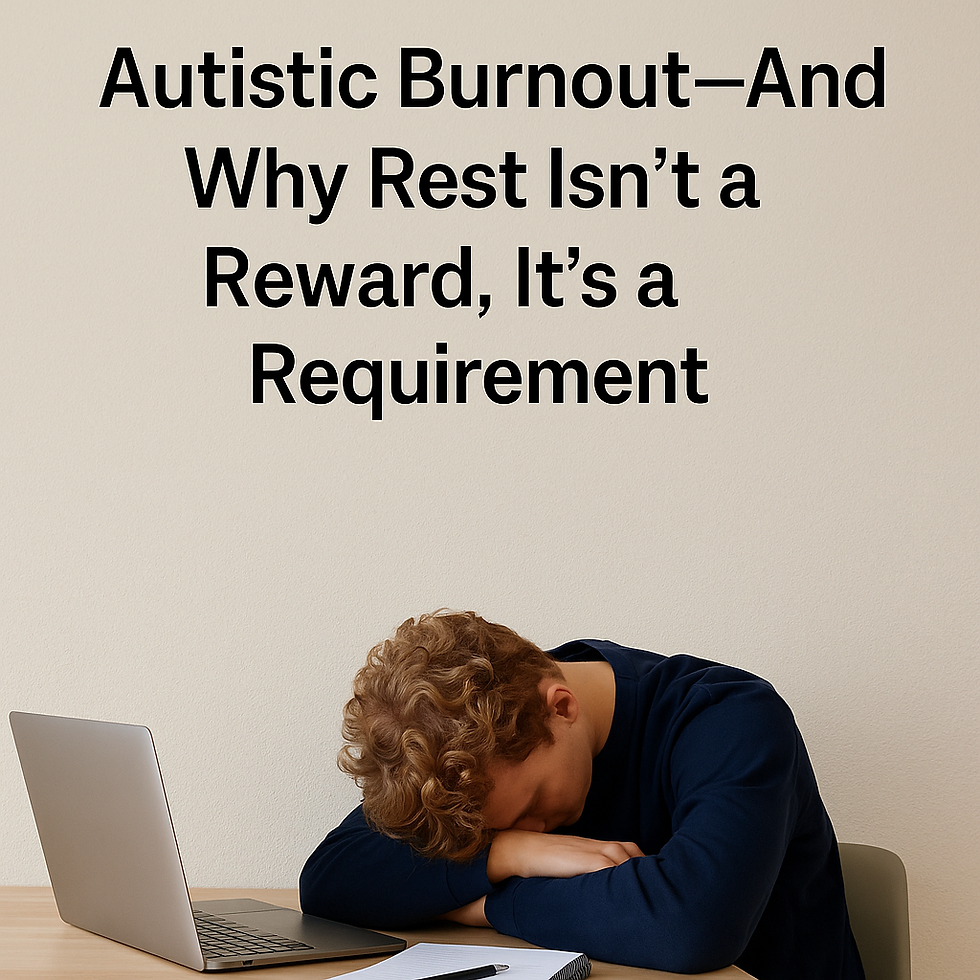Burnout Isn’t Laziness — It’s the Cost of Survival
- James Link

- May 8, 2025
- 2 min read

Why Rest Isn’t a Reward for Autistic People — It’s a Requirement
People love to celebrate productivity. Hustle. Doing more with less.
But there’s a truth a lot of us live with — and rarely say out loud:
Autistic burnout isn’t just exhaustion. It’s depletion. It’s survival mode stretched too thin.
And too often, it’s misunderstood, minimized, or mislabeled as laziness.
What Autistic Burnout Really Feels Like
This isn’t just “being tired.” It’s a full-body shutdown.
It’s sensory overwhelm, emotional fatigue, executive dysfunction, and the weight of constant masking all colliding at once.
It might look like:
Struggling to speak when words once came easily
Avoiding everything because making even one decision feels impossible
Being physically present but mentally wiped
A complete inability to “push through” — even if you want to
And the hardest part?
It doesn’t always look “burned out” to the outside world. It just looks like you’ve stopped trying.
Why It’s So Misunderstood
In a world that rewards non-stop output, burnout is seen as a weakness.
But for autistic people, it often comes not from underperforming, but from over-performing for too long.
We adapt. We mask. We show up in environments that weren’t built for us, just to get through the day.
And that performance adds up. Over months. Over years.
So when the burnout hits, we’re not surprised — but we’re often blamed.
Rest Isn’t a Luxury — It’s Survival Maintenance
Here’s what I wish more people understood:
Rest isn’t a reward you earn after doing enough.
For many of us, rest is the only thing keeping us from shutting down completely.
And rest doesn’t always mean sleep.
It might mean silence. Familiar routines. Less interaction. Dim lights. Saying no without guilt.
Rest looks different for everyone — but for autistic people, it’s not optional.
What I’ve Learned
When I’ve been burned out, it wasn’t because I wasn’t trying.
It was because I tried too hard. For too long. In environments that demanded my energy but didn’t respect it.
And when I finally let myself rest, I didn’t bounce back overnight. Burnout takes time to heal — especially when it’s been building for years.
But healing is possible. When we listen to our bodies. When we stop trying to “perform normal.” When we choose compassion over criticism.
If You’re Not Autistic — Here’s How to Help
You don’t need to fully understand burnout to support someone through it.
You just need to:
Respect when someone says they’re at their limit — even if they “seem fine.”
Stop framing rest as a reward and start honoring it as a need.
Offer space and support without pressure.
Sometimes, the most supportive thing you can say is: “You don’t have to prove anything to me. Just take care of yourself.”
We Deserve to Heal
Burnout isn’t a failure.
It’s a signal — that something has been too much, for too long.
And it’s okay to listen to that signal.
We don’t need to keep pushing just to be valid.
We need space to rest, recover, and reconnect with who we are beneath the pressure.
If you’re feeling that edge right now — this is your permission to step back.
You’re not lazy. You’re surviving.
And you’re allowed to choose healing.





Comments